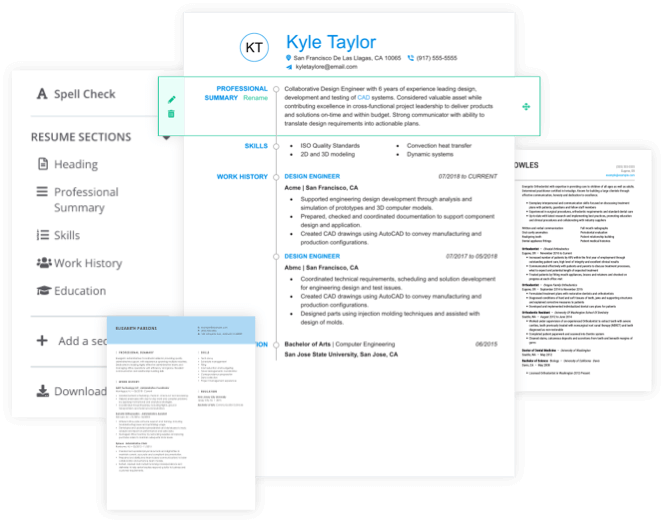- Featured in:

Event project managers plan and execute events, leading teams from the initial conception of the event to its successful completion. This role requires excellent event-planning skills along with the ability to define project milestones and deadlines and coordinate both teams and external contractors to ensure a successful and enjoyable event that meets organizational goals and expectations.
Events project managers need to balance creativity with logistics, financial planning, and vendor management duties. They should excel at multitasking and balancing big-picture concerns like venue and contractor selection with details like décor and meal planning, effectively utilizing resources and personnel to stage large- and small-scale events.
Our certified resume writers have created a library of resume samples to show you exactly what a strong resume looks like. Use them as-is or customize them to your needs.
Improve your application with a personal message! Your resume may summarize your qualifications, but a cover letter can help you express your professional accomplishments and working style. Pair these cover letter templates with our builder subscription to unlock AI-powered text templates and professional designs that will help you submit a complete application.
Event Project Manager Duties and Responsibilities
While the event project manager’s responsibilities can change based on their organization and from event to event, most of the postings that we analyzed shared several essential duties:
Develop Event Concept and Plan
Early in the event planning process, the event project manager's primary duty is to develop an event concept and overall plan. Working closely with an internal or external client, the event project manager gathers information related to the event, including the number of guests, the purpose of the event, and preferences for venues, food, and décor. Based on this information, the event project manager develops proposals and concepts to present to the client.
Select Event Elements and Vendors
Event project managers work with their teams to select elements of the event, beginning with the venue itself. They also select caterers, providing information about attendance and expectations to support vendor bids and financial planning. Additionally, the event project manager may make decisions regarding transportation to and from the event, develop estimates of rooms, food and beverages, and transportation for the event as a whole.
Negotiate Contracts
Additionally, event project managers work directly with vendors and clients to negotiate contracts for various services and products related to the event. They may work with hotels to negotiate a group room rate, for example, or collect caterer bids and negotiate with these companies to keep event costs down. Finally, the event project manager may also work with a venue to develop cost-saving packages by including transportation or entertainment in a contract.
Manage Event Logistics
Before and during the event, event project managers oversee logistics. For large-scale events, this can include many elements such as transportation, lodging, and venue preparation. Even for smaller events, the event project manager needs to develop schedules for food preparation, delivery of supplies, and entertainment to ensure that the event runs smoothly and according to the client's schedule.
Maintain Event Budgets
Event project managers play a vital role in ensuring that events stay on budget. During the planning phase, the event project manager works with clients to develop an overall budget as well as category-specific budgets for certain elements of the event, such as food and venue rental. Throughout the event-planning process, the event project manager identifies opportunities to cut down costs or reallocate funds to ensure that the project stays on budget.
Collaborate with Clients Before and During Events
Event project managers are often the primary point of contact for organizers and clients and are responsible for answering questions and resolving issues that arise over the course of the event. As a result, event project managers tend to be on-site for the event itself to ensure that it goes smoothly and quickly respond to client issues. The event project manager may also provide updates and guidance throughout the planning process.
Event Project Manager Skills and Qualifications
Event project managers balance logistics, financial management, and detailed event-planning tasks. Most event project managers have at least a bachelor’s degree and the following skills:
- Event planning - a background in event planning is key in this role, as most events have many elements that need to work together in order to create a positive experience for guests
- Project management - experience with project management principles and best practices is very helpful in this role to ensure that event elements are organized and event teams stay on schedule
- Vendor relationship management - event project managers work with many vendors leading up to events, so skill with relationship management and negotiation are vital
- Logistics skills - this role requires significant logistics planning and management, so the ability to make decisions about several logistical elements of an event is essential for event project managers
- Budget management - event project managers also oversee financial elements of event planning and execution, so budget and financial management skills are vital
- Communication skills - effective written and verbal communication is also essential in this role, since event project managers need to work with internal teams, clients, and external vendors
Tools of the Trade
Most event project managers should be able to use standard office equipment as well as the following:
Project management software (Asana, Trello)
Event Project Manager Education and Training
While there are no formal education requirements to become an event project manager, most companies prefer applicants with at least a bachelor’s degree. While the specific field is less important, a degree in hospitality management or event planning is very helpful. Experience in an event-planning capacity is essential in this role, and project management certification can help event project managers find employment.
Event Project Manager Salary and Outlook
While the Bureau of Labor Statistics (BLS) does not have specific salary data for event project managers, both Glassdoor and PayScale provide estimates for event managers. PayScale found that event managers earn an average annual salary of $50,039 per year based on 3,204 reported salaries. Glassdoor found that event project managers earn $55,698 per year based on 3,158 salaries.

Helpful Resources
If you’re interested in a career as an event project manager, we found several resources on the web for further reading and information:
"The Five Principles of Project Management for Event Planners"
read this article to learn about the principles and best practices for event project management, from planning to execution
Events Project Management
this book provides essential information about event project management, including logistics and time management
"The Secret to Reducing Event Planning Stress: Project Management Tools"
this article explores the role that project management tools can play in event planning and successful execution
Events Management: Principles and Practice
check out this book for an overview of events planning and management, including budget planning and logistics
Event Project Manager Resume Help
Explore these related job titles from our database of hundreds of thousands of expert-approved resume samples:




